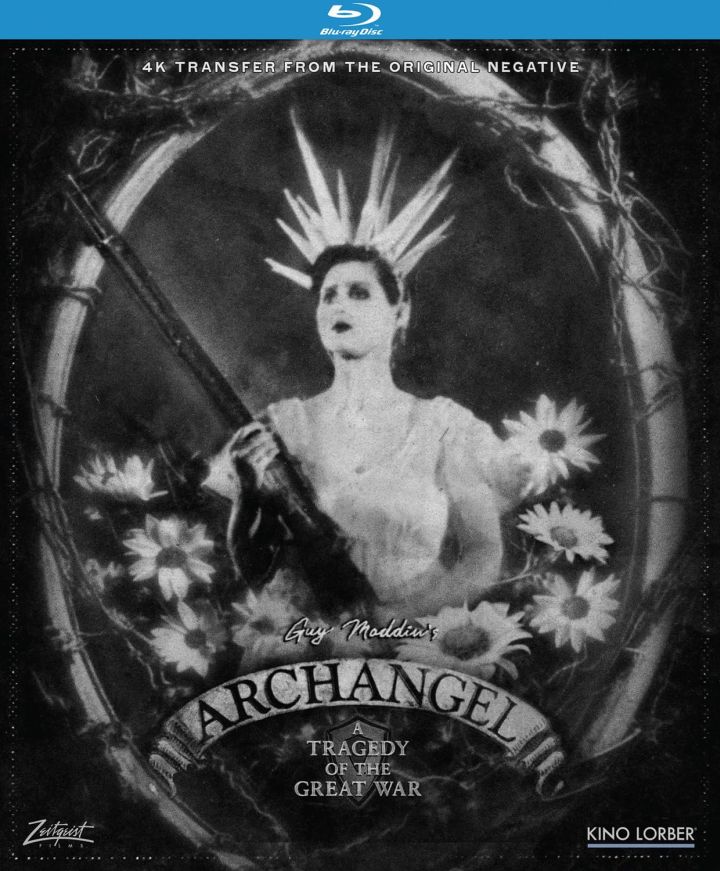
Guy Maddin does not make movies in any particular genre. He makes “Guy Maddin” movies, which are unlike anything else in the world. And they are unlike other things in the most unusual ways. He has his passions: historical settings, the aesthetics of silent film. And an interest in presenting dramatic situations, even melodrama, in a way that drains them of their melodrama. He replaces that with his own weird energy.
Buy Archangel (1990) Blu-rayArchangel (1990), his second feature film, has an advantage over its predecessor, Tales from the Gimli Hospital. With Archangel, it’s possible to describe the bare edges of the plot without seeming like you’re nuts or making it up.
In a small town in the northern tip of the Russian empire in 1917, the various armies of the world have sent tons of ammunition and a rag-tag selection of troops. It’s a vain attempt to forestall the Bolshevik Revolution. A Canadian officer, Boles, is billeted with a family. In the town where they live, he spies a woman who is the spitting image of his lost lover, Iris.
She’s not Iris, she insists, she’s Veronkha. Boles is confused, maybe shell-shocked. Even more so is Officer Philbin, who comes to town claiming to be Veronkha’s husband. He’s been gone to the war for more than year, but he’s a partial amnesiac, and believes every day is his wedding day. It’s a love triangle that starts bizarrely and gets weirder as the participants become more confused, seemingly by the day.
It’s complicated by the woman in the family Boles is staying with falling in love with him. She’s got two children and a cowardly husband. In case we couldn’t tell, the intertitle informs us that he’s a coward.
Because Archangel has intertitles. And silent scenes. But also, plenty of scenes with sync dialogue. Or only sync in part, and then silent. Or the dialogue will continue while the characters mouths are closed. It’s shot in black and white, often using vignetting blurring the edges of the frame.
The story’s plot is simple, if sometimes obscure. Boles pines, events occur. Eventually the war (which we’re told in the opening is over) comes to the town and all able-bodied men are called to the front. The women come, too, with Veronkha leading the charge.
The battlefield is ghostly and strange, and all obviously shot on a sound stage… as is everything else. Archangel does not let you forget for a moment that it is a movie. Everything looks hand-made, and mostly artificial, and is weird. Its narrative style is elliptical. When Veronkha starts to warm to Boles, she gives him a treasure map to come find her. He tries and moves through a strange vignette of visiting places in town and the battlefield. The sequence is repeated three times in its entirety throughout the film, with mostly minor variations.
Parts of the movie seem a little unstuck in time, too. When Philbin first comes to see Veronkha, he has a bandage on his head. The next day, he’s fine, but Boles ends up cracking him in the same place with his rifle butt. So much in this film is so head-scratching that I do not even know if that’s something intentional, or I’m inferring it.
The film early on breaks into a propaganda film about the beauties of civilization, and the monstrous evil of the Germans and the Bolsheviks. The Germans are rutting vampiric beasts. Bolsheviks always dress in rags and cover themselves in straw and filth. It’s laid on thick and kept thick throughout the whole time.
Archangel is amusing, though I don’t think that I laughed. It’s totally artificial, but in that artifice there’s real sincerity. I never get the impression Maddin is doing anything for an effect other than his own interest or amusement. It’s weird, but the opposite of pretentious.
There are themes of how ideals and idols can poison real relationships. There’s a parody of propaganda and melodrama. But there’s also a scene where fluffy bunnies infiltrate the trenches. The soldiers pet them until the Huns arrive. Again, it’s weird, and perhaps for an extremely specific audience. Running at just under 80 minutes, that’s probably enough time spent in this fascinating, perplexing dream world.
Archangel has been released by Kino Lorber on Blu-ray. Extras include a newly recorded commentary by director Guy Maddin, and a trailer.